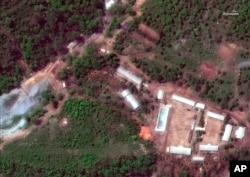It’s off – at least for now.
President Donald Trump has canceled his planned June 12 summit in Singapore with North Korean leader Kim Jong Un.
"I was very much looking forward to being there with you (in Singapore)," Trump said in a letter to Kim released by the White House. "Sadly, based on the tremendous anger and open hostility displayed in your most recent statement, I feel it is inappropriate at time time to have this long planned meeting."
The “last straw,” according to a White House official, was an insult of U.S. Vice President Mike Pence earlier Thursday in a statement by North Korea’s vice foreign minister, Choe Son Hui. She called Pence a “political dummy” and warned – in rhetoric typical of that uttered by Pyongyang – of a nuclear confrontation.
Trump in his letter, responded in kind, referencing U.S. nuclear capabilities “so massive and powerful that I pray to God they will never have to be used.”
The White House official says “there is a backdoor that's open still if the North Koreans are willing to walk through it. But it involves some changing of their rhetoric ... at a minimum.”
Trump, in his letter, also left the door open, telling Kim that if he changes his mind "having to do with this most important summit, please do not hesitate to call me or write."
In Seoul, Kim Eul-kyeom, who is a spokesman for South Korean President Moon Jae-in, told reporters officials there are “trying to figure out what President Trump’s intention is and the exact meaning of it.”
North Korea had threatened to pull out of the unprecedented summit after U.S. officials called for a Libya model approach, which involved the country’s total nuclear dismantlement before any concessions were granted. Pyongyang has called for a gradual process that links early concessions to incremental denuclearization measures.
“The world, and North Korea in particular, has lost a great opportunity for lasting peace and great prosperity and wealth. This missed opportunity is a truly sad moment in history,” Trump concluded.
Secretary of State Mike Pompeo, in Senate testimony on Thursday, shortly after Trump’s letter was made public, said the United States still wants a “complete” denuclearization of North Korea.
North Korean counterparts over the past several days had not responded to inquiries from the summit planners on the American side, said Pompeo.
“We were fully, fully engaged over the past weeks to prepare for this meeting,” Pompeo replied to senators during questioning. “We were rockin’.”
Pompeo later added – when asked about his meetings in Pyongyang with Kim Jong Un on the subject of reaching a deal about complete North Korean denuclearization “there was little doubt in my mind that he understood the scope of what we were asking for.”
The top Democrat on the Senate Foreign Relations Committee, Ben Cardin, told reporters he still thinks that diplomacy is the best path as “I haven’t seen anything to date that would change the need for direct discussion.”
The speaker of the House of Representatives, Republican Paul Ryan, in a statement, said: “The North Korean regime has long given ample reason to question its commitment to stability. We must continue to work with our allies toward a peaceful resolution, but that will require a much greater degree of seriousness from the Kim regime.”
Ryan added that Congress “has provided significant tools to hold North Korea accountable, and it is important that the United States not relent in this maximum pressure campaign.”
Ben Rhodes, deputy national security advisor during the administration of Barack Obama, said on Twitter that “Trump has never once explained what he is trying to achieve in North Korea and how is going to achieve it. All he has done is raise expectations which gives leverage away to everyone else (see China’s trade talks).”
“This is an inflection point in the administration policy toward North Korea,” according to Vipin Narang, associate professor of political science at the Massachusetts Institute of Technology and a member of MIT’s Security Studies Program.
“One camp may prefer to see if working level diplomacy can get things back on track, and maybe eventually get to a summit. Another camp may try to use this as evidence that diplomacy is doomed to fail, and that denuclearizing North Korea by force—attacking a nuclear weapons power—is the only remaining option,” Narang, an author of two books on nuclear strategy, tells VOA News. “If North Korea resumes long range missile or nuclear tests, it would sharply embolden and empower the latter camp. So if Kim is truly interested in some deal -- well short of disarmament obviously -- his smartest move now is to exercise restraint.”
North Korea, on Thursday, shut down its Punggye-ri nuclear test site on Thursday to demonstrate its commitment to denuclearization.
About 30 invited foreign journalists watched explosions of an observation tower at Punggye-ri.
While the complex’s closure is viewed as significant symbolically, analysts say it does not seriously inhibit North Korea’s ability to conduct future nuclear tests.








